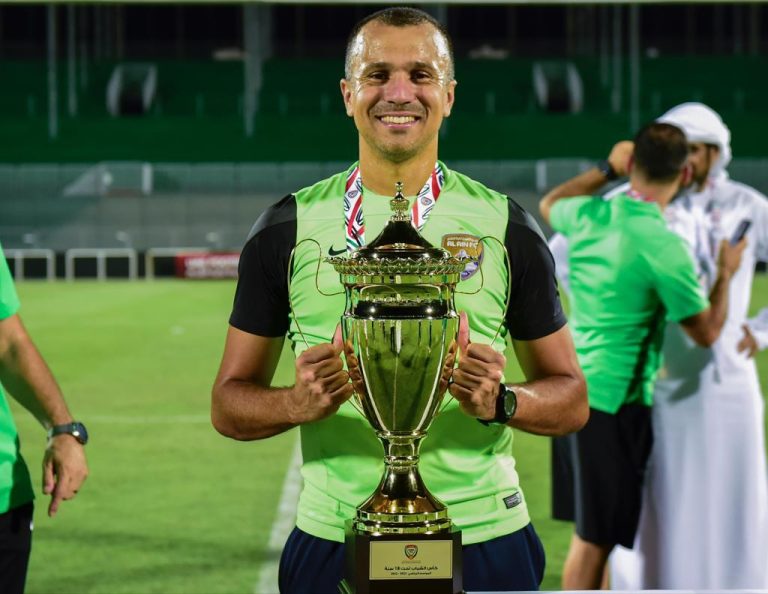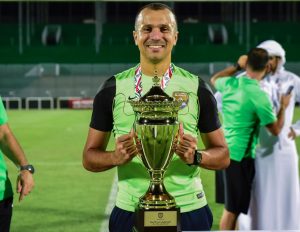
“I often say it’s impossible to talk about a game model before talking about the feelings for the game and the emotions that shaped them”, Luís Spadetto
Born in the countryside of Espírito Santo, Brazil, Luís Spadetto, now 36 years old, built his relationship with football at a very young age — between futsal, dusty fields, and organizing street tournaments in his hometown. Even as a child, he showed an interest that went beyond playing: he created teams, thought about formations, and naturally took on the role of coach. That early period laid the foundation for a journey marked by enthusiastic leadership, deep game insight, and sensitivity in dealing with people.
UEFA licensed, with coaching education completed in Portugal and Italy, Luís also holds a Level “A” futsal license — not by chance, but by conviction. “I grew up playing futsal, and talking about Brazilian football is inevitably talking about street football and futsal,” he emphasizes. For him, this background directly influences his game interpretation and methodological choices. His commitment to studying the game has even led him to be invited as a guest lecturer at CBF Academy, where he also began his formal national coaching education and plans to complete all the required licenses. “I really enjoyed the course, and Professor Edson Palomares does an excellent job,” he says. Luís believes that investing in the professional development of coaches and fostering knowledge exchange are essential for Brazil to return to winning — and convincing — on the global stage.
A former professional player, he played for seven years in Portugal, a country that welcomed him at the age of 17. He ended his playing career at 26 due to recurring injuries and began an early transition into coaching. Even at a young age, he demonstrated maturity to lead groups and develop original ideas. Despite his age, he consistently left strong impressions at clubs in Brazil — including a notable stint at SC Internacional’s youth academy. With each new challenge, he has sought to build high-performance environments by blending European structure with Brazilian creativity.
In one of these coaching moments, already 27 and managing in Brazil, he had a symbolic exchange with a young player recently promoted to the first team. Spadetto told him: “Trust me, one day you’ll play in the Champions League.” Nearly two years later, that same player — Neto Borges, now at Middlesbrough (England) — would make his debut in Europe’s top competition. For Spadetto, it’s not about predicting the future, but about believing in people’s potential and knowing how to communicate that belief with honesty. And Spadetto recalls, “They didn’t want me to play him. I bet on Neto against all odds. I used to look up at the sky and say, if this kid doesn’t become a top-level player, then I’m not a football coach either”.
“Today, he is the assistant coach of Al Ain FC’s U-23 squad, the most prestigious club in the United Arab Emirates. There, he plays an active role in a highly successful cycle: five titles in three years, contributing directly to the tactical, technical, and collective growth of the team. More than results, he
stands out for his influence on the individual development of players and his ability to adapt concepts to the local context. “What surprised me most here was the ambition of the club. Al Ain has a solid structure, qualified professionals, and keeps evolving with vision and planning. I’m grateful for the opportunity to be part of this Arab giant,” he says.
Fluent in four languages and with complementary degrees in Sports Psychology and Business Administration, Spadetto sees continuous learning as a pillar of his career. He dreams of returning to Brazil to work at the highest level and contribute to the development of players and ideas in a new chapter for Brazilian football.
Off the pitch, he maintains a strong connection with his rural roots — he enjoys horses, reading, and long walks in the countryside. “The Brazilian people are special,” he says. “That’s why I keep studying, learning, and preparing — so I’ll be ready when the opportunity to give back arrives.”
This profile revisits the defining chapters of a journey that crosses continents, blends cultures, and reveals how a Brazilian coach is building his path in modern football with consistency, identity, and character.
Check out the chat in the Portuguese version
Heading into the Fourth Season in the UAE: Lessons, Challenges, and Growth in Middle Eastern Football
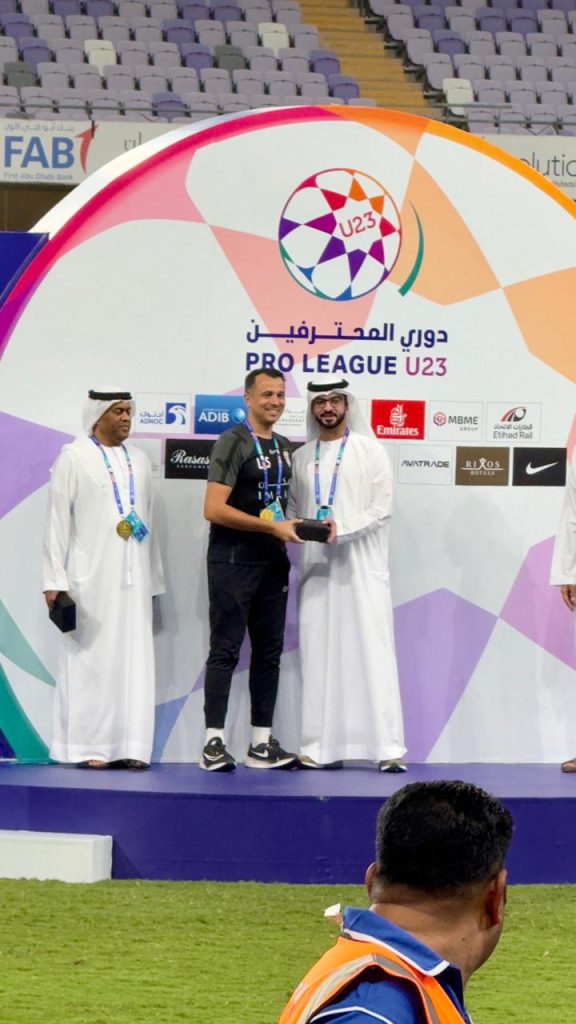
How was your cultural and professional adaptation process upon arriving in the United Arab Emirates?
My adaptation in the UAE was quite natural. In Brazil, I had the opportunity to live and work in different states, experiencing various cultures and realities. That taught me to respect and learn from differences. Here, even with a new language and customs, I found a welcoming environment, high- level professionals, and a people who value respect and coexistence. All of that made my transition very positive.
What were the main challenges you faced in the day-to-day of football in the UAE, both on and off the pitch?
The biggest challenge was adapting to my new role as an assistant coach, coming from a background in Brazil where I worked as head coach and was known for my intensity and constant presence in the club’s daily routine. I’ve always had the freedom here to create, contribute, and express myself, but at first, it was an exercise in balance — learning to “slow down” and understand my space within a different structure. Off the field, the challenge was more emotional: detaching from that 24/7 commitment to the club. Over time, I learned to channel that energy more strategically, always focused on contributing to the project.
What has most positively surprised you about the structure and development of football in the Middle East?
What surprised me the most was Al Ain FC’s ambition. It’s a club that, despite its important history and solid structure, continues to seek growth. There is a clear mindset of evolution, with consistent investment, strong organization, and a vision for the future. Like anywhere in the world, there’s always room for improvement — and I see Al Ain deeply committed to that process. I’m grateful for the opportunity to be part of this project within such a major club in the Arab world.
How do you see the day-to-day dynamics of working in a foreign coaching staff, with different cultures, ideas, and ways of viewing the game? I work in an all-Italian staff, and I can confidently say we earned our place here through hard work and persistence. Nothing was handed to us — we built credibility every day, with serious work, mutual respect, and full commitment to the project. We have different cultures and perspectives, but as long as there’s respect, everything becomes possible — and even enriching. We are five fighters. We want to win.
Our head coach and academy director is Matteo Lombardo, and I work alongside Claudio Di Marco (also assistant coach), Roberto Cianfarani (goalkeeper coach), and Francesco Negro (fitness coach). We’re five in this close-knit technical staff, and despite cultural differences, the common goal has always been clear: to win, to develop players, and to evolve as a team. When there’s commitment, honesty, and respect for the game, ideas come together — and the work grows.
What have been your biggest takeaways from these three years working in the UAE?
I’ve learned that football is much bigger than I once imagined. I see Arabs as kind and gentle people — if you are good to them, they will be good to you. Working here has broadened my perspective and made me see the game as a global phenomenon, constantly evolving. It’s a giant sport, but in many ways, still growing like a child. I’ve grown as a coach, but above all as a human being — learning from different ways of thinking and living the game.
How has this international experience impacted the way you see football?
This experience has completely changed how I see the game. Today, I view football with a wider lens — more strategic, and also more human. I’ve learned to listen better, to adapt my ideas to different contexts, and to value the coach’s role as an educator. In the UAE, I’ve learned that football is also a bridge between cultures — and that with respect, faith, and purpose, it’s possible to build something truly meaningful.
Away From Home Since Age 11: A Journey of Growth and Learning in Brazil’s Top Youth Football Academies
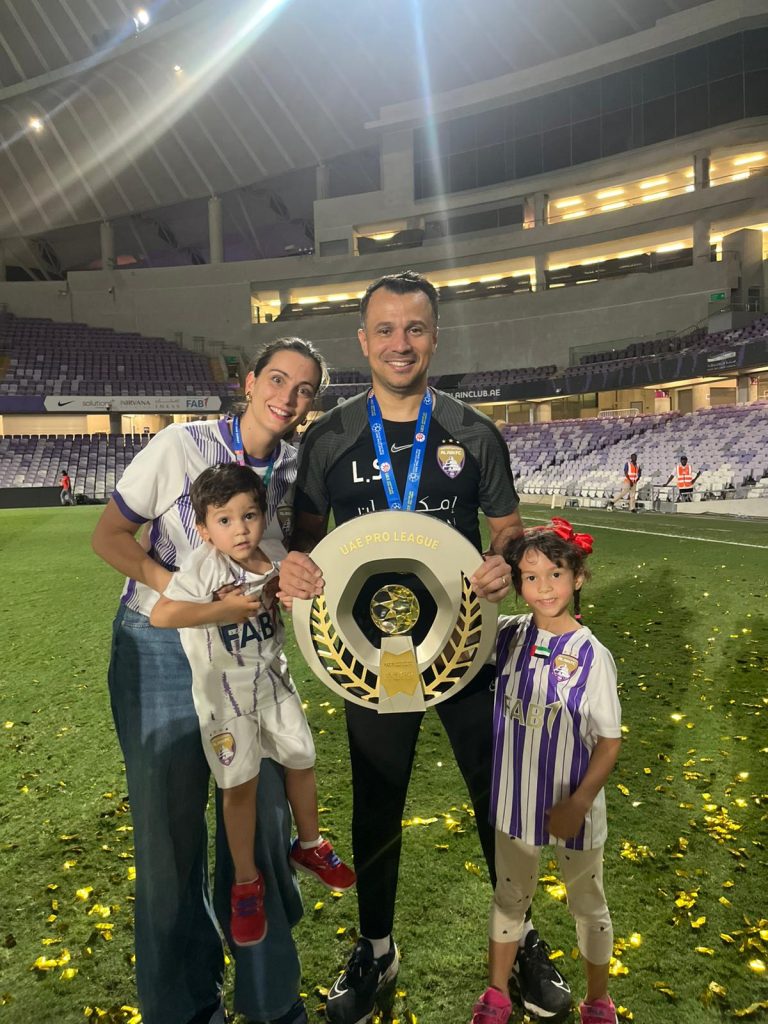
How was your journey as a player, and how did your youth academy experiences influence your decision to become a coach?
I went through the youth systems of major Brazilian clubs like Atlético Mineiro, Botafogo, and SC Internacional. Those were important years, where I learned a lot about the game and experienced high-performance football from a young age. I turned professional at 16 and moved to Europe at 17. I played professionally in Portugal for seven years until recurring injuries forced me to end my career at 26. Nearly ten years as a pro. It was hard to accept, but that moment also opened the door to a new phase. I began studying and observing the game from a different angle and realized I wanted to stay in football — now as a coach. It was a premature transition, but it felt natural and made me grow a lot.
What role did your family roots play in your football journey?
Football was always part of my family’s routine. My father was passionate about the game — if you let him, he’d watch four matches a day on TV and fall asleep listening to football on the radio. I think all of that went straight into my subconscious. He passed on that passion to me and, above all, taught me to respect the player. My brother, on the other hand, showed me the value of being close to athletes — not their best friend, but someone present, trustworthy, who knows when to support and when to challenge. These examples shaped me and still guide me today, both on and off the pitch. I also need to mention my mother and sisters — strong women, teachers of psychology, Portuguese, and history. My love for reading and studying comes from them too; it all comes together. And today, I understand that football is indeed a subject — one you must study — but above all, you need to feel it.
How do your experiences in the streets, on futsal courts, and at home reflect in the way you train and communicate with your players?
All of that directly influences my work. Street football and futsal taught me to value creativity, 1v1 situations, and quick decision-making. The streets shape you without you realizing it. At the same time, the family environment instilled in me values like respect, listening, and a true passion for the game. Today, I try to create a training environment that is intense but human. I like to stay close to the players, understand their moments, and communicate with clarity and honesty. I believe that when players feel trust and freedom, they have more room to grow — both as athletes and as people.
What was it like dealing with the distance from your family at such a young age — just 11 — and what did it teach you as a person and a professional?
It was tough. Leaving home at 11 is not easy. I struggled a lot, but I knew what I wanted, and that made a difference. When you have a clear goal, it pushes you — but it also has downsides. We carry scars that we only understand later on. At the same time, all of that made me mentally very strong. I learned how to handle pressure, responsibility, and solitude. That shaped me as a person — before any degree or title ever did.
What changes do you notice in youth football today compared to your time as a young player?
I don’t like to judge what’s being done today. Everything changes — and it should change, hopefully for the better. But looking back, back then access to things was more difficult. You had to prove your worth every single day because every week, new boys would arrive trying to take your spot. There was constant competition, and that kept you alert all the time. I think that environment shaped us into natural competitors because there was no room to relax. You had to grow with it.
How does your playing background influence your sensitivity when working with young players in development?
Deep down, I’m still a player. In my heart, that flame never went out — but my mind is fully focused on coaching now: on the process, on player development, and on building a team. I care deeply about the players because I know exactly what they’re going through. I’ve been in their shoes. I always try to help, to guide, but I’m demanding too. I like being close, listening, understanding each one’s moment. I’m a friend — but not their best friend. I believe a coach needs that balance between trust and accountability, and my experience as a player gave me that sensitivity.
Organizing Passion: CBF Academy and the Future of the Brazilian Coach
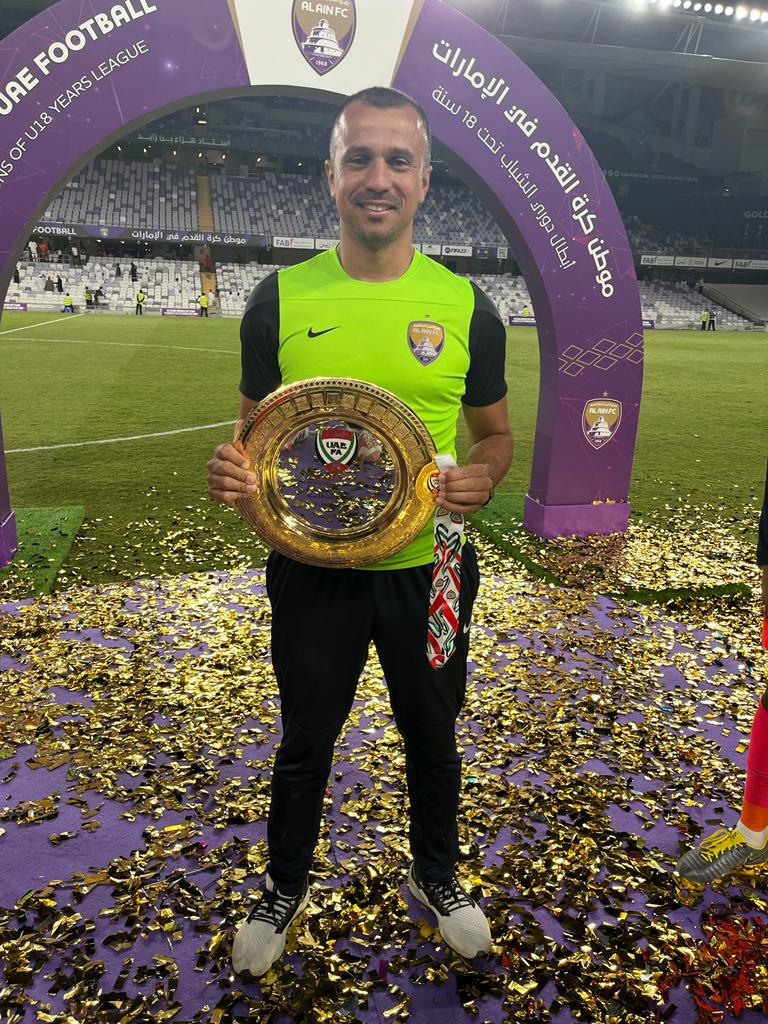
What were the main lessons you took from your first course at the CBF Academy?
Being in my first official training course in my own country was a source of pride and emotion. Even though I was on vacation after a demanding season and a significant title, I made a point of spending 10 days in São Paulo to experience it. I came back with a full bag — especially regarding organization and process management, a theme strongly emphasized throughout the course. Beyond the content, the atmosphere was inspiring: meeting committed professionals who share the same passion for football was truly memorable.
As I’ve said before: “I’ve always wanted to be a coach. What motivates me the most is helping a player discover that he can go further than he imagines.”
How do you evaluate the exchange of experiences among Brazilian professionals during the course?
It was one of the most rewarding aspects. I met enthusiastic people, eager to learn and succeed — traits very characteristic of our people. The exchange was rich, genuine, and I felt renewed seeing how many quality Brazilian professionals are willing to share ideas and build together. I made many contacts and definitely intend to maintain these relationships — because they carry technical, human, and future value.
How do the CBF Academy’s contents complement your international coaching background?
My international training gave me a solid foundation, but being at the CBF Academy reconnected me with the soul of Brazilian football. The content I experienced not only complements my journey but also revives elements of our identity — with methodology, science, and practical application.
As I often say: “I carry with me the essence of Brazilian football — that creativity, improvisation, and sensitivity that come from futsal and street football. Europe helped me structure those ideas, to give logic to what was once mostly intuitive.”
The course was serious and intense, and I’ve already planned to continue with the next licenses this year. I’m sure this path will be essential for my growth as a professional.
What is your view on the role of the CBF Academy in coach development?
Without a doubt, the home of the Brazilian coach is the CBF Academy. There’s no question about it. I’ve spent over 10 years in Europe and learned a lot there. But to be honest, when I took the course at CBF, I saw a lot of quality content. What I admire most about Brazilian coaches is their natural leadership — and that can’t be bought, it’s in our DNA. The CBF Academy exists to organize the passion we have for the game. That’s what it’s about: organizing passion.
What is still missing for Brazilian coaches to become world references again?
Honestly, I can’t say exactly — because I’m a Brazilian coach. But I believe that if we start speaking other languages and our licenses gain international validity, the landscape might begin to change. Brazilian coaches are passionate, natural leaders, and brave. And to coach in Brazil, you need courage — even Argentine coaches say that when they come to work here. I’m convinced that the new generation of Brazilian coaches will change this story. Brazil will be back in the spotlight — mark my words. The last World Cup already showed a glimpse of what we are.
What could boost the development of Brazilian coaches in practical terms?
Many European coaches who come to Brazil say the same thing: “In Brazil, there is no training.” And I understand what they mean. Because, indeed, how can you evolve something that isn’t practiced consistently? But even within that reality, the Brazilian coach adapts — and that’s where he shines in leadership and strategy. Why? Because without time to train the game model, he works on management, communication, reading scenarios, decision-making under pressure. The game teaches — and the Brazilian coach, within the chaos, still finds solutions. That’s a huge virtue.
“What I admire most in Brazilian coaches is their leadership and group management. Our people are talented and special. That reflects on the pitch.”
Why is there still so much pressure on Brazilian coaches without considering the context in which they work?
Let’s talk about culture. Brazilians are creative, passionate, communicative, and above all, brave. That’s in our people — and it’s also in our coaches. So why is there still this insistence on criticizing Brazilian coaches without understanding the context they’re in? Here, if you lose two or three games, they’re already talking about dismissal. That created a discouraging environment, where coaches are more concerned with protecting themselves than proposing ideas. Few, like Fernando Diniz, try to go against that system. Most were shaped to survive — not to take risks.
If we look abroad honestly, we’ll see that even well-known coaches like Jorge Jesus had a much longer path. He coached small teams for years in Portugal, was even relegated, and only later had stability to develop his model. And he certainly had much more time to train and implement ideas than any Brazilian coach has today — not just because of experience, but because of the system he was part of.
What advice would you give to young Brazilian coaches starting their careers?
Advice? I don’t think I have the right to give advice. I’m no one for that. What I can say, with respect and sincerity, is that Brazil will soon be winning again with our national team, and Brazilian coaches will have more opportunities around the world.
But when that moment arrives, we need to be ready: with updated licenses, continuous study, and above all, with languages. Because knowing football is important, but being able to communicate in different contexts is what will open doors and sustain this new cycle.
Talking About the Game — Tactical Questions for Luís Spadetto
Luís, what defines your game model, or what shapes your idea of football?
I usually say that it’s impossible to talk about a game model before talking about the feeling for the game and the emotions that shaped it. Everything starts there: with what you feel about football. I’m intense by nature, and I expect my players to be as well. I like to have the ball — but to attack. I like to press high — also to attack. I value aggressiveness: showing with all your strength that you want to win. The opponent must feel that our passion is stronger than theirs. It’s not the idea that wins — it’s the feeling.
My cousin has ideas — he’s super intelligent, he even knows the name of the president of Japan by heart — but he never puts them into practice because he lacks intensity. So yes, you can have many ideas and intentions. But what really drives everything is passion, feeling, emotion, and the will to win. I want everything from the game: the ball, the time, the rhythm, the space, the physical and emotional duels. Everything. Victory. That’s what the game is about — winning. At any cost — but not in any way.
When I began studying football to become a coach, I had to go back to my past. I always tried to build an authentic, genuine game model based on what I feel. I really reflected on my childhood, on what moved me. And that’s when I realized that my way of seeing the game comes from a deep place
— from lived experience, not just learned knowledge. I am competitive and ambitious, so I want my players to feel that too. They need to sense that my eyes and my heart burn with the desire to win — but my mind is always calm.
How do you view the evolution of positional play in recent years?
More than a strictly positional evolution, I see a progression in players’ decision-making processes. If we agree that football is time and space, then rhythm is at the center of it all. To me, understanding the rhythms of the game is what truly allows a player to make good decisions — with or without the ball. Rhythm dictates everything: when to speed up, when to hold, when to occupy or release space. That’s where the real sophistication of the modern game lies, in my opinion.
In your view, what role do inter-sector relationships play in the success of an effective game model? Is the connection between lines still underestimated in modern football?
To me, more than simply talking about connections between lines or sectors, it’s crucial to understand that this is much deeper than it seems. We hear a lot about “compactness,” but being compact is different from playing compactly. And that difference lies in the quality of connections. Finding the ideal connection between players and sectors might be one of the greatest challenges within a game model. I believe that through well-designed stimuli, with variations in context and intensity, you can help the team develop that kind of collective understanding and harmony.
What defines a well-organized defensive team in your opinion? Is it more about the block, behaviors, or collective understanding of game moments?
To me, a well-organized defensive team begins with the coach’s clear understanding and the players’ discipline and commitment. You have to want to defend. That requires passion — and yes, that’s also part of the connection that goes beyond mere compactness. Compacting is one thing — defending in sync is another, much deeper level. It involves collective reading, coordinated effort, and intent. The coach’s heart matters here too. If he values defending and communicates that with truth, the players will begin to feel the same. Organization stems from clarity, connection, and a shared will to protect the game.
How do you interpret the importance of individual duels in an increasingly collective and positional game? Is 1v1 still decisive?
The game is 1v1. Football is built on duels — physical, technical, mental. And often, before anything else, the duel is 1v0: you versus yourself. Even when you’re alone, you can make the wrong decision. The greatest players in history were great because they made good decisions in pressure zones with little time. But the detail is: before the ball even arrived, they were already making decisions. The collective game depends on this — on individuals who can win their duels, including internal ones.
Modern football increasingly demands in-game reading and adaptation. How do you see player autonomy in that context? Is it possible to develop more tactically aware athletes without limiting creativity?
When we talk about tactics, we’re talking about everything — it can’t be reduced to something rigid. Tactics are a combination of principles, concepts, behaviors, and interactions that make the game function. A player’s reading is fundamental in that process, and often they deliver more than you asked
— as long as they know what they’re looking for. That’s why the most important thing is knowing what to ask and how to ask for it. I like naming things within tactics because it makes understanding easier, creates a shared language, and helps players make clearer decisions within the model. Autonomy is built through clarity, not unstructured improvisation.
In your observation, which elements are the hardest to consolidate in a game model: on-ball behavior, off-ball behavior, or transitional moments? Why?
For me, the hardest thing to consolidate is the human aspect. Instilling human values in a group is more challenging — and more important — than any technical or tactical content. Because if you look deeper, you’ll see that on- or off-ball behaviors depend directly on discipline, respect, and collective commitment. And that can’t be enforced through command — it’s built on clear principles and a core idea that gives meaning to everything. When a player respects the team, the process, and the reasons behind them, he performs with greater authenticity. Tactics work better when they’re backed by human conviction.
What is your view on the role of physical preparation and statistics in modern football? To what extent should these elements influence decisions within a game model?
The physical component is a part of football. In short: it exists, it’s important — but more important than it existing is how it fits into the coach’s model. The player must know how to run within the game idea — not too little, not too much — but with quality and purpose. Regarding statistics, I also see them as facts, but we need to be cautious: everything depends on interpretation. Numbers are tools, not absolute truths. It’s subtle: either you know how to read the data within context, or you get lost in it. For me, both physical performance and numbers have value — as long as they serve the game and don’t dictate it.
Do you intend to return to Brazil someday? What are your goals for the future?
I know what I want — but I also know what I don’t want. I feel good where I am, and I’m truly grateful for this opportunity. I’m evolving with every step, and right now, my next plan is to get a good night’s sleep, wake up tomorrow, and help us have a good training session. What really motivates me is having health. Honestly, that’s what drives me. I love Brazil — I’m Brazilian — but football is unpredictable. If you ask me whether I want to be a head coach in Brazil’s first division one day, my answer is yes. If you ask me whether that will happen, I’ll say: only God knows. I want it, and I will do everything I can to make it happen. Football today, just like life, is unpredictable. In Brazil, we often say, “the future belongs to God.” That’s my life philosophy. God guides me.
Thank you very much for the interview, Luís. It was a pleasure to hear your story, your reflections, and your vision of the game. I leave this conversation with the strong feeling that we are looking at the rise of one of Brazil’s next great coaches. The depth, clarity, and humanity you bring are deeply inspiring — and your journey so far speaks for itself. The future looks incredibly promising.
Leia mais sobre o Brasileirão em nosso site!
Nos siga nas redes sociais: Facebook, Instagram e X.


